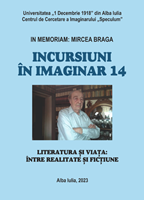INTROSPECȚIE EXPERIMENTALĂ ȘI PSIHOLOGIE CULTURALĂ ÎN IUBIRE MAGICĂ
EXPERIMENTAL INTROSPECTION AND CULTURAL PSYCHOLOGY IN MAGICAL LOVE
Author(s): Iuliana PĂUNESCUSubject(s): Aesthetics, Romanian Literature, Culture and social structure , Sociology of Culture, Theory of Literature, Sociology of Literature
Published by: Editura Aeternitas
Keywords: imbalance; the theory of personality migration; personality substitution; folklore traditions;
Summary/Abstract: The story is part of the psychological fantasy, the limit situations in which the characters fall due to an imbalance between culture, related to their inner or personal life, and respectively civilization, social life, the external world in which the characters evolve. The innovative element of the story emerges from the balanced ratio between the real and bookish, by recreating a legend in a real situation, by adopting the theory of personality migration. The psyche of the heroes is marked by unusual experiences that lead to the modification of their ways of perception. In Magical Love, Vasile Voiculescu presents the psychoerotic mechanism caused by the complex play of the poet's imagination and intelligence, the character in the story, an erudite with a scientific mentality, based on logic, wanting to write a replica of Goethe'swork, Faust, with roles reversed. His intention was to reverse the pact with the devil in Faust, switching the action to heaven and overturning the senses. However, the effect will be totally unexpected: she will not have a pure and loving Margaret, but a witch-Margarita, a real female Mephisto. The hero of the story realizes that the condition he perceives is an obsession that reaches the level of personality substitution, a psychological phenomenon that occurs under the effect of the substitution in imagination of the feminine ideal. The fact that the tempted woman accumulates attributes of cerebrality demonstrates Voiculescu's confidence in a possible restoration of androgynous perfection. Voiculescu's intention to demystify the supernatural element from folklore traditions, resorting to psychology, is evident. The events related are subject to a process of derealization, the author distancing himself from the action by multiplying the points of view, the perception of the facts by the large number of narrators. The first narrator, serving as a mere narrative convention, recedes to make way for the poet, the doctor, and the painter. The triggering element that has an effect on the poet is the discussion about the folkloric influence of the sea, the result being the recollection of an incident from his youth, when he had accompanied a friend, a collector of folklore, to an isolated mountain village. The description of the events is direct and sprinkled with many details, their interpretation depending on the attitude of the storyteller. Although there are signs of the unnatural and suggestions of magic, the narrator tries to find a logical explanation, precisely to discourage a perception of a secondary reality, visibly belonging to the occult, not surprising in the cultural psychology of the world of the rather deserted village, without social life, without church and priest. Vasile Voiculescu's story does not focus on the events and situations, but on the way of perception of the female character by the male characters.
Journal: Incursiuni în imaginar
- Issue Year: 1/2023
- Issue No: 14
- Page Range: 89-103
- Page Count: 15
- Language: Romanian

